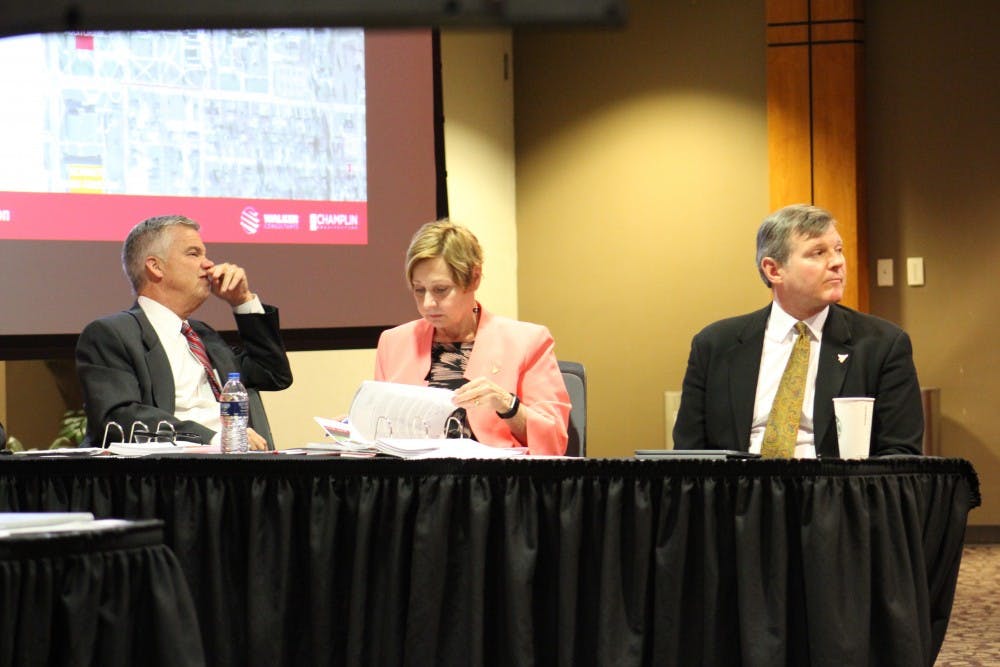Diversity was the theme of the first public Board of Trustees committee meeting March 30.
The committee invited a report on diversity and inclusion from Associate Vice President for Student Affairs and Enrollment Services, Ro Anne Royer Engle; Director of Employee Relations and Affirmative Action, Melissa Rubrecht; and Interim Associate Provost for Diversity Melinda Messineo.
The first presentation from Rubrecht described the affirmative action plan and its three key concepts: workforce analysis, job group analysis and action-oriented programs.
Per Rubrecht’s 2016 workforce analysis, Ball State’s employees currently are 55 percent female and 12 percent minority.
More than 3 percent of employees have disabilities, which is shy of the seven percent recommendation the federal government would like to see, Rubrecht said.
However she said this is likely due to underreporting of disabilities to supervisors. For example, Rubrecht said individuals who use insulin pumps might not realize they can report a disability.
“I’m sure we exceed the 7 percent,” Rubrecht said.
Messineo gave the University Diversity Committee report next, in which she laid out the progress of diversity efforts.
One of the committee’s roles is to assess diversity and find ways to improve it. In 2015, diversity complaints totaled to 41, and in 2016 they fell to 38, Messineo said.
In looking at reports from the Office of Institutional Diversity, the University Diversity Committee said programs like Dream Makers Day, the diversity associates program, the gender equity task force and PhD Pathways all help forward the university’s goal of increased diversity.
For Engle’s presentation for the Council on Diversity and Inclusion, she presented ideas brought up by students at this semester’s Beneficence Dialogues.
One major point was looking toward what campus could do for its LGBTQ student population. Engle said one major thing students asked for was an LGBTQ resource center, complete with staff trained specifically to work there,
“What we’ve heard from the students is that the burden of this has often fell on Spectrum, the student organization, and that is not the appropriate place,” Engle said.
In addition to supporting initiatives for LGBTQ students, Engle said the Council will continue to understand how students from marginalized identities interact with their peers and professors both inside and outside the classroom.
Later, University senate chair Kourtland Koch gave a report of governance restructuring to the committee.
The main goals of the new structure are to adjust representation on governance of faculty and professional staff, and also to re-organize responsibilities of governance members.
Koch said the current organization led some new senators to be confused about their roles while simultaneously over-committing themselves by working on multiple committees.
“We found out that once you were appointed to serve on the senate, there was a lot of duplication,” Koch said. “You not only were a senator but you were assigned to faculty council.”
The committee meeting closed with information from the Honors College presented by dean John Emert.
The Honors College, Emert said, takes a two-fold approach — recruiting high-caliber students, whether they decide to be in the Honors program or not, and having distinctive learning experiences.
Emert also announced journalism professor Adam Kuban will be the 2018 Ball Brothers Foundation Honors Faculty Fellow for the next two years.
“This is a tool by which I can attract a faculty member on campus who has great potential, has tools I need to have brought into the Honors College for a short-term basis.”
Contact Sara Barker with comments at slbarker3@bsu.edu or on Twitter at @sarabarker326.





